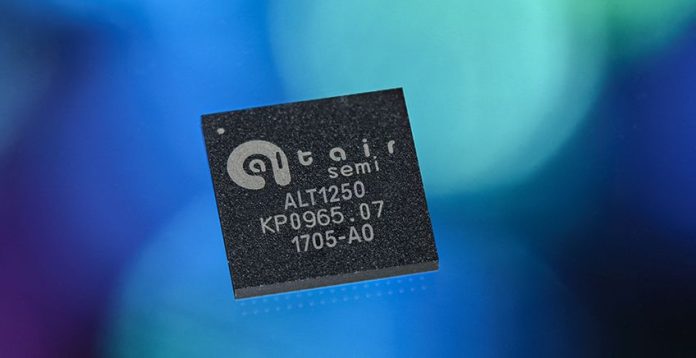Israeli firm Altair Semicondictor will embed ‘cloud location over cellular’ (C-LoC) software into its ALT1250 dual-mode NB-IoT and LTE-M chipset. It has worked with C-LoC technology firm Polte Corporation on the initiative.
Altair claims the ALT1250 dual-mode cellular IoT chipset is the market’s smallest, enabling module sizes of less than 100 square millimeters, and also its most highly integrated. It also features ultra-low power consumption, GNSS location positioning, a hardware-based security framework, and an RF front-end supporting all commercial LTE bands.
Polte’s location-as-a-service (LaaS) solution leverages 4G and 5G cellular networks and cloud computing to enables accurate location data indoors and outdoors for business processes, customer self-service automation, and better decision making insights, it said.
Oded Melamed, chief executive at Altair Semiconductor, said: “With demand for smaller and low powered IoT devices, Polte’s C-LoC technology is a great complement to the integrated GPS and GNSS capabilities of our dual-mode ALT1250 chipset.
He added: “Location is a key function in numerous IoT applications, such as smart meters, telematics, and trackers, where low power and small form factor are crucial.”
Ed Chao, chief executive at Polte, said: “Polte is poised to disrupt the location services market. As more and more IoT use cases demand indoor, outdoor, and everywhere in-between location, Polte’s software-only solution embedded on Altair’s dual-mode ALT1250 chipset delivers location services – at a lower cost, using less battery, more securely.”
Japanese carrier NTT DOCOMO has just approved the ALT1250 for NB-IoT and LTE-M. The chipset is now active on the NTT DOCOMO network.
Takeshi Higuchi, vice president and general ,anager for NTT DOCOMO’s communication device development department, commented: “ALT1250 will open up the market for even more IoT devices to run on our network.”
Meanwhile, rival firm Sequans, which announced C-LoC integration on its headline LTE-M and NB-IoT Monarch platform in January, has also picked up a couple of approvals in Japan.
Its Monarch system-in-package (SiP) and Monarch GM01Q module have been approved for use by Japan’s “three largest mobile operators”, it said. NTT DoCoMo, KDDI and Softbank Mobile dominate the Japanese market. Both devices are based on Sequans’ Monarch LTE-M/NB-IoT chip.
Georges Karam,chief executive at Sequans, said: “IoT in Japan is a huge market opportunity and we are pleased to provide the certified Monarch GM01Q module and Monarch SiP as complete and proven solutions for IoT device makers who can now launch their products anywhere in Japan with total confidence.
“The certification of Monarch SiP and GM01Q follows the earlier certification of our Monarch chip on which these modules are based, showing that Monarch has become an integral part of Japan’s important LTE for IoT ecosystem.”
The Monarch SiP integrates a multi-band RF front end module from Skyworks using “conformal shielding” that enables it to meet the size requirements of the smallest IoT devices. Both Monarch GM01Q and Monarch SiP are designed as “total solutions” for device makers to build IoT devices with the ultra-low power consumption and enhanced coverage capabilities that are needed for successful IoT business cases, said Sequans.
The Monarch SiP and Monarch GM01Q have also received compliance certifications from Japanese regulatory agencies JATE (Japan Approvals Institute for Telecommunications Equipment) and TELEC (Telecom Engineering Center).
The Monarch GM01Q is also certified in the US, Europe, and Australia; the Monarch SiP is certified in the US.

